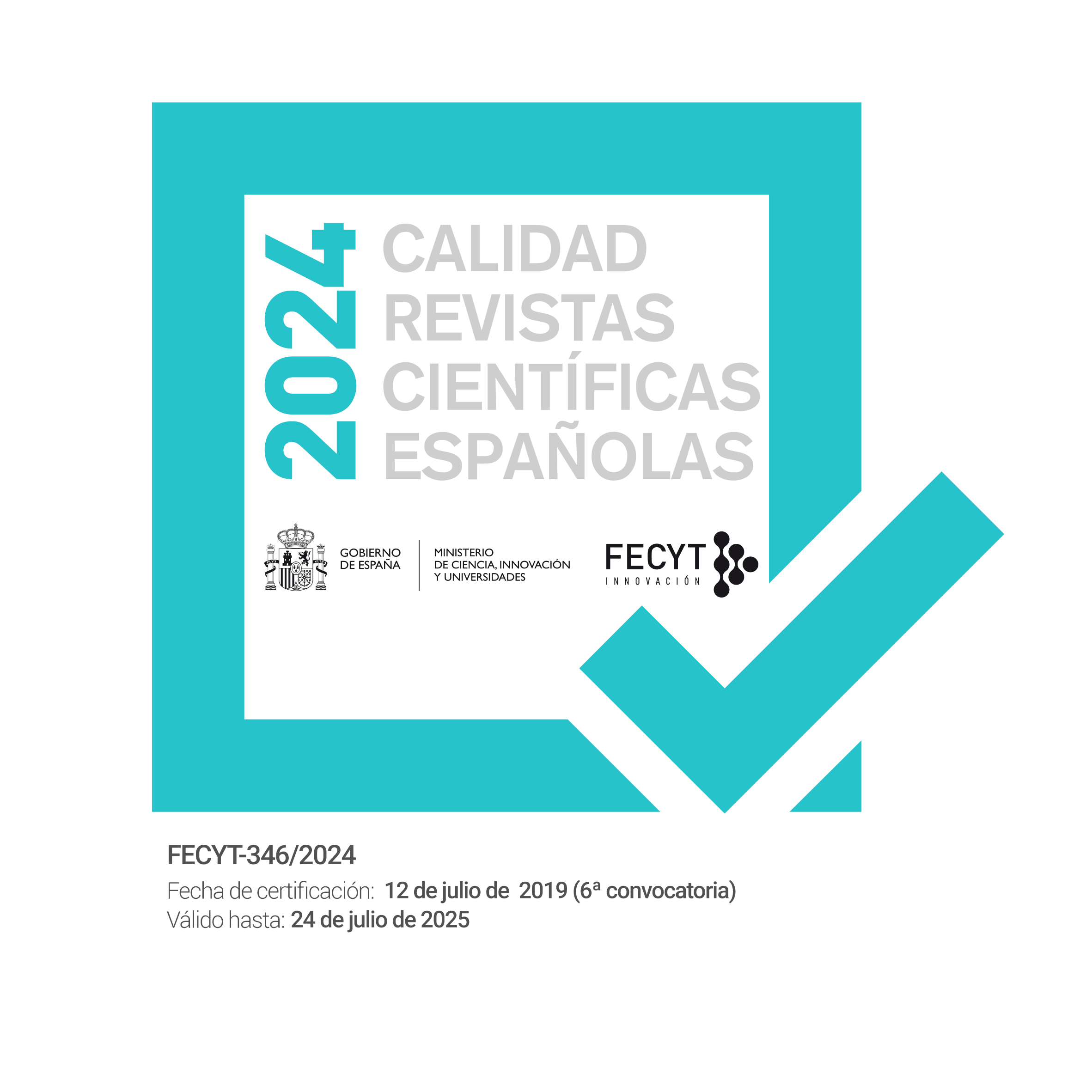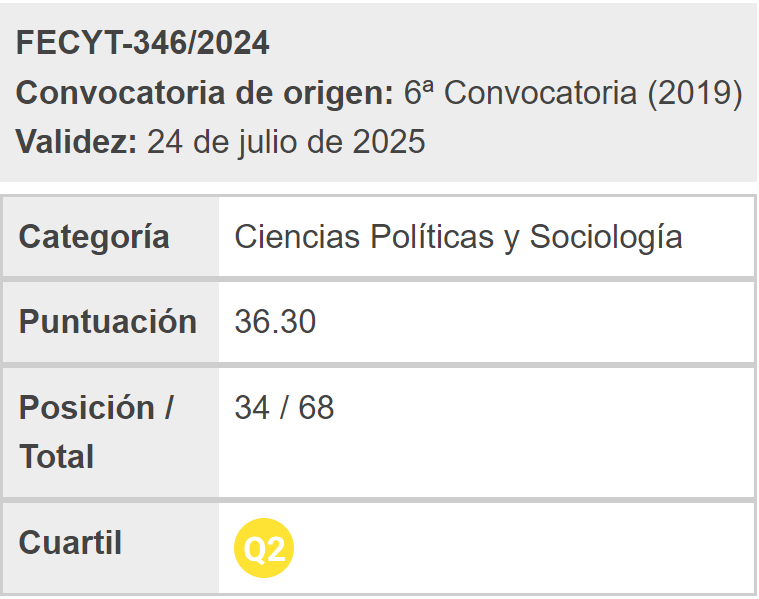Radical right and populism: are they consubstantial or contingent? Clarifications regarding the case of VOX
Keywords:
radical right, populism, Spain, VOX, discourse analysisAbstract
Recently, VOX has managed to institutionalize itself in the political arena, ending the so-called “Spanish exceptionalism”. VOX has been immediately defined not only as a radical right party, but also as populist. This is in the line with a considerable part of the literature which conceives any radical right’s expression as intrinsically populist. Notwithstanding, there are reasons to question this view, which is sometimes uncritical and has little empirical foundation. Using the Discourse-Theoretical Analysis (DTA) approach, electoral manifestos and speeches are analyzed with the aim to examine in depth VOX’s discourse. Our findings show that VOX’s ideological offer is basically a nationalist narrative rooted on an antagonism between the endogroup vs. the outgroup. Hence, it is not possible to identify any attempt in order to build discursively a popular subject. In sum, our findings point the need to develop a new research agenda about the radical right which conceives populism not as inherent, but as a contingent feature. Moreover, this approach should be more nuanced and systematized, being necessarily rooted in the empirical evidence.
Downloads
References
Abascal, Santiago (2018). Discurso Vistalegre I, (enlace).
Abascal, Santiago (2019). Discurso Vistalegre II Plus Ultra, (enlace).
Abascal, Santiago (2020). Discurso Vistalegre III, (enlace).
Acha, Beatriz (2017). Nuevos partidos de ultraderecha en Europa Occidental: el caso de los Republikaner alemanes en Baden-Württemberg. Tesis doctoral. Universidad Autónoma de Madrid.
Acha, Beatriz (2019). No, no es un partido (neo) fascista. Agenda Pública, 6 de enero.
Adorno, Theodor; Else Frenkel-Brunswi, Daniel Levinson y Nevitt Sanford (1950). The authoritarian personality. Harper.
Alonso, Sonia y Cristóbal Rovira (2015). Spain: No Country for the Populist Radical Right? South European Society and Politics, 20(1), 21-45. https://doi.org/10.1080/13608746.2014.985448
Art, David (2013). Why 2013 is not 1933: The radical right in Europe. Current History, 112(752), 88-93. https://doi.org/10.1525/curh.2013.112.752.88
Arzheimer, Kai (2018). Conceptual Confusion is not Always a Bad Thing : The Curious Case of European Radical Right Studies. En K. Marker; M. Roseneck; A. Schmitt y J. Sirsch, (Eds.), Demokratie und Entscheidung (pp. 23-40). Springer. https://doi.org/https://dx.doi.org/10.1007/978-3-658-24529-0_3
Balinhas, Daniel (2020). Populismo y nacionalismo en la “nueva” derecha radical española. Pensamientos Al Margen. Revista Digital de Ideas Políticas, 13, 69-88.
Bar-On, Tamir (2018). The Radical Right and Nationalism. In J. Rydgren (Ed.), The Oxford Handbook of the Radical Right (Issue 2018). Oxford University Press. https://doi.org/10.1093/oxfordhb/9780190274559.013.4
Bara, Judith (2005). A question of trust: Implementing party manifestos. Parliamentary Affairs, 58(3), 585–599. https://doi.org/10.1093/pa/gsi053
Betz, Hans-Georg (1994). Radical Right- Wing Populism in Western Europe. St. Martin’s Press.
Betz, Hans-Georg (2018). The Radical Right and Populism. En J. Rydgren (Ed.), The Oxford Handbook of the Radical Right. Oxford University Press. https://doi.org/10.1093/oxfordhb/9780190274559.013.4
Betz, Hans-Georg y Stefan Immerfall (1998). New politics of the Right: Neo‐populist Parties and Movements in Established Democracies. MacMillan.
Betz, Hans-Georg y Carol Johnson (2004). Against the current - Stemming the tide: The nostalgic ideology of the contemporary radical populist right. Journal of Political Ideologies, 9(3), 311-327. https://doi.org/10.1080/1356931042000263546
Carter, Elisabeth (2018). Right-wing extremism/radicalism: reconstructing the concept. Journal of Political Ideologies, 23(2), 157-182. https://doi.org/10.1080/13569317.2018.1451227
De Cleen, Benjamin (2017). Populism and nationalism. En C. Rovira, P. Taggart, P. Ochoa y P. Ostiguy (Eds.), The Oxford handbook of populism (pp. 342–362). Oxford University Press.
De Cleen, Benjamin (2019). The Populist Political Logic and the Analysis of the Discursive Construction of ‘the People’ and ‘the Elite.’ En J. Zienkowski y R. Breeze (Eds.), Imagining the Peoples of Europe. Populist discourses across the political spectrum (pp. 19–42). John Benjamins Publishing Company.
De Cleen, Benjamin; Jasson Glynos y Aurelien Mondon (2018). Critical research on populism: Nine rules of engagement. Organization, 25(5), 649-661. https://doi.org/10.1177/1350508418768053
De Cleen, Benjamin y Yannis Stavrakakis (2017). Distinctions and articulations: A discourse theoretical framework for the study of populism and nationalism. Javnost, 24(4), 301-319. https://doi.org/10.1080/13183222.2017.1330083
Ferreira, Carles (2019). Vox como representante de la derecha radical en España: un estudio sobre su ideología. Revista Española de Ciencia Política, 51, 73-98. https://doi.org/10.21308/recp.51.03
Gallego, Ferrán (2006). Una patria imaginaria: la extrema derecha española (1973-2005). Síntesis.
Griffin, Roger (2000). Interregnum or endgame? The radical right in the “post-fascist” era. Journal of Political Ideologies, 5(2), 163–178. https://doi.org/10.1080/713682938
Hawkins, Kirk; Ryan Carlin, Levente Littvay y Cristóbal Rovira (2019). The Ideational Approach to Populism. Concept, Theory and Analysis. Routledge.
Laclau, Ernesto (2005). Populism: What’s in a name? In F. Panizza (Ed.), Populism and the Mirror of Democracy (pp. 32-49). Verso.
Laclau, Ernesto (2006). La razón populista. Fondo de Cultura Económica.
Laclau, Ernesto y Chantal Mouffe (1987). Hegemonía y estrategia socialista. Siglo XXI.
Llamazares, Iván (2012). La communauté nationale menacée. Inertie et transformations de l´idéologie ultranationaliste de l´extrême droite espagnole. In A. Fernández y M. Petithomme (Eds.), Les nationalismes dans l’Espagne contemporaine (1975-2011). Compétition poli- tique et identités nationales (pp. 77-102). Armand Colin.
Llamazares, Iván y Luis Ramiro (2006). Les espaces politiques restreints de la droite radicale espagnole. Une analyse des facteurs politiques de la faiblesse de la nouvelle droite en Espagne. Pôle Sud, 25, 137-152. https://doi.org/https://doi.org/10.3406/pole.2006.1358
Lubbers, Marcel y Marcel Coenders (2017). Nationalistic attitudes and voting for the radical right in Europe. European Union Politics, 18(1), 98-118. https://doi.org/10.1177/1465116516678932
Mudde, Cas (1996). The war of words defining the extreme right party family. West European Politics, 19(2), 225–248. https://doi.org/10.1080/01402389608425132
Mudde, Cas (2007). Populist Radical Right Parties in Europe. Cambridge University Press.
Mudde, Cas y Cristóbal Rovira (2013). Exclusionary vs. inclusionary populism: comparing contemporary Europe and Latin America. Government and Opposition, 48(2), 147-174. https://doi.org/10.1017/gov.2012.11
Ortega, Iván (2012). La naturaleza comparativa de los Estudios de Caso. Una revisión politológica sobre el estado de la cuestión. Encrucijadas. Revista Crítica de Ciencias Sociales, 4, 81-94.
Ortiz, Pablo (2019). The Electoral Breakthrough of the Radical Right in Spain : Correlates of Electoral Support for VOX in Andalusia (2018). Genealogy, 3(4), 72. https://doi.org/doi:10.3390/genealogy3040072
Ortiz, Pablo; Antonia María Ruiz y Manuel Tomás González (2020). El caso español y sus implicaciones para el estudio de la ultraderecha: antecedentes y nuevas estrategias de investigación. Revista de Estudios Políticos, 188, 199-220. https://doi.org/10.18042/cepc/rep.188.07
Ramet, Sabrina (1999). The Radical Right in Central and Eastern Europe since 1989. Pennsylvania State University Press.
Ramos-González, Jorge y Pablo Ortiz (2021). Radicalism and populism: do they always go hand by hand? A comparative ideological analysis of the radical left and the radical right in Spain, The Second Helsinki Conference on Emotions, Populism, and Polarisation, 6-8 mayo, Helsinki.
Robertson, David (1976). A Theory of Party Competition. Wiley.
Rodríguez, José Luis (1992). La extrema derecha en España: del tardofranquismo a la consolidación de la democracia (1967-1982). Universidad Complutense de Madrid.
Rooduijn, Matthijs; Stijn van Kessel, Caterina Froio, Andrea Pirro, Sarah de Lange y Daphne Halikiopoulou (2019). The PopuList: An Overview of Populist, Far Right, Far Left and Eurosceptic Parties in Europe. www.popu-list.org.
Rydgren, Jens (2007). The Sociology of the Radical Right. Annual Review of Sociology, 33(1), 241-262. https://doi.org/10.1146/annurev.soc.33.040406.131752
Rydgren, Jens (2017). Radical right-wing parties in Europe. Journal of Language and Politics, 16(4), 485-496. https://doi.org/10.1075/jlp.17024.ryd
Stavrakakis, Yannis; Giorgos Katsambekis, Nikos Nikisianis, Alexandros Kioupkiolis y Thomas Siomos (2017). Extreme right-wing populism in Europe: revisiting a reified association. Critical Discourse Studies, 14(4), 420-439. https://doi.org/10.1080/17405904.2017.1309325
Taggart, Pierre (1995). New populist parties in Western Europe’. West European Politics, 18(1), 43-51.
Taggart, Pierre (1996). The New Populism and the New Politics. MacMillan.
Turnbull-Dugarte, Stuart (2019). Explaining the end of Spanish exceptionalism and electoral support for Vox. Research y Politics, 6(2), 1-8. https://doi.org/10.1177/2053168019851680
Turnbull-Dugarte, Stuart; José Rama y Andrés Santana (2020). The Baskerville ’ s dog suddenly started barking : voting for VOX in the 2019 Spanish general elections in the 2019 Spanish general elections. https://doi.org/10.1080/2474736X.2020.1781543
von Beyme, Klaus (1988). Right-Wing Extremism in Post-War Europe. West European Politics, 11(2), 1–18.
VOX (2018). 100 medidas de VOX para la España viva, (enlace).
Zulianello, Mattia (2019). Varieties of Populist Parties and Party Systems in Europe: From State-of-the-Art to the Application of a Novel Classification Scheme to 66 Parties in 33 Countries. Government and Opposition, 1-21. https://doi.org/10.1017/gov.2019.21
Downloads
Published
How to Cite
Issue
Section
License
Copyright (c) 2021 Encrucijadas. Revista Crítica de Ciencias Sociales

This work is licensed under a Creative Commons Attribution-NonCommercial-NoDerivatives 4.0 International License.
Los autores/as conservan los derechos de autor y ceden a la revista el derecho de la primera publicación, con el trabajo registrado con la licencia de atribución de Creative Commons Reconocimiento-NoComercial (CC-BY 4.0), que permite a terceros utilizar lo publicado siempre que mencionen la autoría del trabajo y a la primera publicación en esta revista. Encrucijadas permite y se anima a todas las personas autoras a depositar la versión final publicada en repositorios institucionales o temáticos de acceso abierto, cumpliendo en caso necesario los términos establecidos por la entidad financiadora de la investigación.




